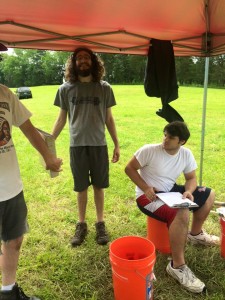As this field school comes to a close, I find it important to reflect on the experiences of these rapidly waning weeks and to ask what has been learned. The more I contemplate this question, the more certain ideas begin stand out in my mind. First, my concept of Archaeology has changed drastically. My interest in Archaeology has grown extensively with my expanding understanding of working in the field. My Archaeological career has been limited to lab work up to this point, along with a chance occasion to visit some sites in Holly Springs, Mississippi during the past year. These early experiences were eye opening and have certainly helped to prepare me conceptually for working in the field. I can pick out artifacts, somewhat describe them (some very much more so than others), and utilize them to construct some basic interpretations of a site. Fieldwork, while it has expanded and reinforced those capabilities, has exposed new frontiers in my interpretative capabilities. Being there, in the ground, reading the story concealed in the soil creates a feeling which is hard to compare. It’s something akin to assembling a 3-D puzzle with no edges to guide you, nor the convenient box top template for comparison. Once you know what to look for though, things begin to emerge all over, but this knowing only comes from experience.
field. I can pick out artifacts, somewhat describe them (some very much more so than others), and utilize them to construct some basic interpretations of a site. Fieldwork, while it has expanded and reinforced those capabilities, has exposed new frontiers in my interpretative capabilities. Being there, in the ground, reading the story concealed in the soil creates a feeling which is hard to compare. It’s something akin to assembling a 3-D puzzle with no edges to guide you, nor the convenient box top template for comparison. Once you know what to look for though, things begin to emerge all over, but this knowing only comes from experience.
This brings me to the second important aspect of field school, the importance of the team. Without the experience of a trained eye, the work we’re doing would be neigh impossible. Dr. Meyer’s knows this soil, and she knows this site. What appears as an enigmatic jumble to my untrained mind creates a map in her trained one. Her interpretations illuminate a dark, soiled circle as a structural post. Hamilton’s input constantly challenges my personal interpretations as well. Our conversations concerning what is means to be “Mississippian” has greatly expanded my view of the history we are uncovering. And, the more I catch on, the more I start to see the story in the soil myself. For instance, I found myself realizing that the multitude of posts we are locating do not simply represent static structures, but could be places where wear and tear prompted a need to shore up a wall. Tapping into the reality of site in this way, I feel, can only come from immersing oneself in it.
But, even our fieldwork, in all its encompassing and exhausting glory, is nowhere near the limit of this experience. Our fairly disparate group has come together through these weeks (though not without some bumps along the way) to reach an inspiring balance of openness and lightheartedness. My peers have enhanced this experience greatly, both on and off the site, and pushed me to explore the nascent possibilities in this serene countryside. The community has been highly receptive to our work as well. People value history in all its iterations here in Lee County, and the common drive to explore the past creates a powerful sense of acceptance and valuing of our work. I think this other, more personal side of field school has taught me a profoundly new way to value Archaeological work.